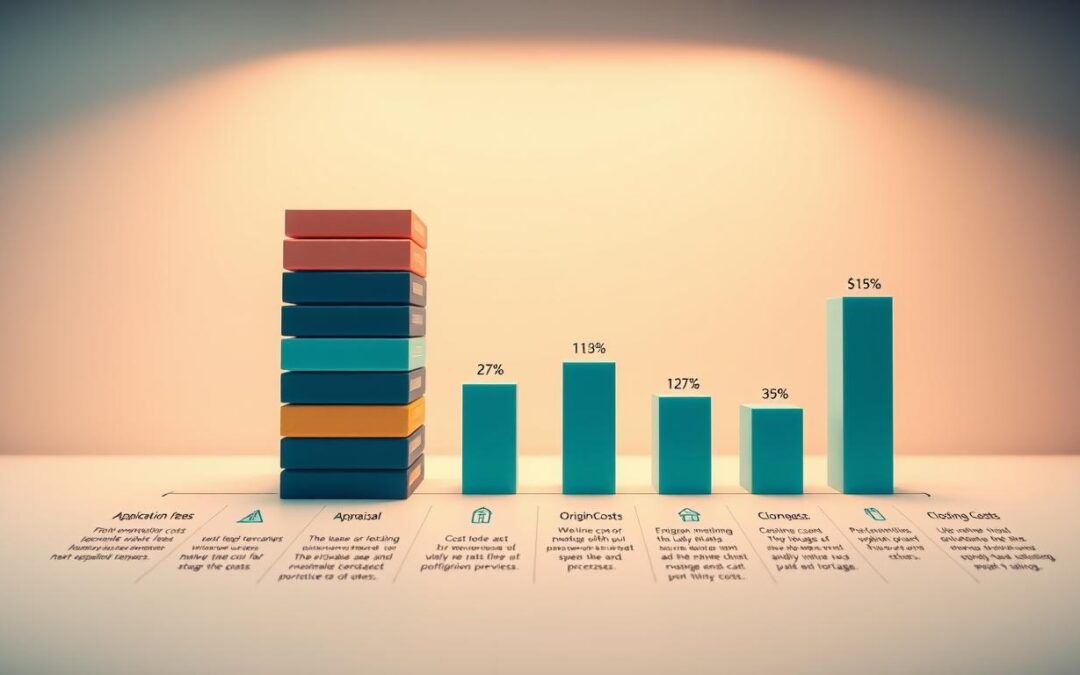Refinancing a mortgage is a big financial move. At Oak Real Estate, we know you want to know the costs. The usual costs are between 2% and 6% of the loan amount. In 2023, the average closing costs were $4,243.
It’s important to understand the costs of refinancing. When you’re thinking about refinancing, you need to consider all the expenses. These can include origination fees, appraisal costs, title insurance, and more. All these add up to the total cost of refinancing.
Key Takeaways
- Refinancing costs typically range from 2% to 6% of the loan amount
- Average closing costs in 2023 were $4,243
- Multiple fees contribute to the total refinancing expense
- Homeowners should calculate possible long-term savings
- Professional advice can help with the refinancing process
Understanding Mortgage Refinancing Basics
Mortgage refinancing is a smart move for homeowners. It helps improve loan terms and financial health. By getting a new loan, homeowners can gain big financial benefits.

Refinancing lets homeowners change their mortgage for better terms. They get a new loan to pay off the old one. This often comes with better rates or loan terms.
What is Mortgage Refinancing?
Mortgage refinancing means swapping your current mortgage for a new one. It offers several benefits:
- Lower monthly payments
- Reduced interest rates
- Access to home equity
- Change in loan term length
Why Consider Refinancing Your Mortgage?
Homeowners might refinance for many reasons. Strategic mortgage refinance fees make it appealing under the right conditions.
| Refinancing Motivation | Potential Benefit |
|---|---|
| Lower Interest Rates | Reduce monthly payments |
| Home Equity Access | Fund major expenses |
| Loan Term Adjustment | Shorten or extend repayment period |
Types of Mortgage Refinancing Options
There are various refinancing options for different needs:
- Rate-and-Term Refinance: Adjust interest rate or loan duration
- Cash-Out Refinance: Extract home equity as cash
- Streamline Refinance: Simplified process for government-backed loans
Knowing these options helps homeowners choose wisely. It’s important to compare refinance rates and fees to get the most benefits.
Average Refinancing Costs in 2024
Understanding refinance closing costs is key. In 2024, homeowners face different expenses when refinancing. The total costs usually range from 2% to 6% of the loan amount.
Here are the average costs homeowners might see:
- Lender fees: 0.5% to 1% of the refinanced loan amount
- Home appraisal: Approximately $550 for a single-family home
- Loan origination fees: Usually 0.5% to 1% of the mortgage amount
Here’s a detailed look at possible refinancing costs:
| Expense Category | Average Cost | Percentage of Loan |
|---|---|---|
| Lender Fees | $750 – $1,500 | 0.5% – 1% |
| Home Appraisal | $550 | N/A |
| Title Services | $500 – $1,000 | Varies |
| Total Refinancing Costs | $3,000 – $9,000 | 2% – 6% |
Freddie Mac says the average closing costs are around $5,000. Homeowners need to think about their situation. This includes current interest rates and how long they’ll stay in their home. Experts say refinance only if the new rate is at least 0.75 percentage points lower.
How Much Does It Cost to Refinance a Mortgage?
Refinancing a mortgage has many financial aspects to consider. It can affect your savings over time. Knowing the costs helps homeowners decide if refinancing is right for them.
The cost of refinancing usually falls between 3% to 6% of the loan amount. Homeowners should use a refinance mortgage calculator to see if they can save money.
Breaking Down Standard Refinancing Fees
There are several key costs to understand when refinancing:
- Application fees: $75 — $500
- Appraisal fees: $300 — $1,000
- Underwriting fees: $300 — $900
- Credit report fees: $10 — $100 per borrower
- Origination fees: 1% — 1.5% of loan amount
Understanding Closing Costs
Closing costs are a big part of refinancing. They can greatly affect the financial gain of refinancing. The interest rates play a big role in deciding if the costs are worth it.
| Cost Type | Typical Range |
|---|---|
| Title Services | $300 — $2,000 |
| Survey Fee | $150 — $400 |
| Attorney Fees | $500 — $1,000 |
| Recording Fee | Up to $250 |
Additional Expenses to Consider
Some hidden costs can surprise homeowners. Private Mortgage Insurance (PMI) might be needed for loans with less than 20% equity. Also, think about any prepayment penalties from your current mortgage.
Pro Tip: Use a refinance mortgage calculator to estimate total costs and savings before deciding.
The break-even point is key in deciding if refinancing is financially smart. It’s found by dividing total closing costs by monthly savings. For example, if costs are $5,000 and savings are $200, it takes 25 months to break even.
Application and Origination Fees Explained
Understanding refinance loan fees can be tough for homeowners. These costs include several key expenses. It’s important to know them before refinancing your mortgage.
Application fees are the first cost in refinancing. They can be from $75 to $500, depending on the lender. Some lenders might not charge this fee to stay competitive.
- Typical application fee range: $75 – $500
- Some lenders offer fee waivers
- Fees cover initial processing expenses
Origination fees are also key in refinancing. They pay lenders for handling the new loan. These fees are usually 0.5% to 2% of the loan amount. For a $250,000 loan, you might pay $1,250 to $5,000 in origination fees.
| Loan Amount | 0.5% Origination Fee | 2% Origination Fee |
|---|---|---|
| $200,000 | $1,000 | $4,000 |
| $250,000 | $1,250 | $5,000 |
Smart borrowers can try to negotiate these fees. Lenders might lower or remove some charges. This depends on your credit score, loan size, and market conditions.
Pro tip: Always compare multiple lenders to find the most competitive refinancing costs and possible fee waivers.
Understanding Appraisal and Home Inspection Costs
Refinancing your mortgage is a big step. Home appraisals are key in this process. They check the property’s value and help figure out closing costs.

Appraisal costs usually fall between $300 and $500. It’s important to include these costs in your refinancing plan.
Home Appraisal Process and Fees
The appraisal does several things for lenders and homeowners:
- Determines current property market value
- Validates home condition and possible risks
- Helps set borrowing limits
- Offers an independent property check
There are different appraisal types:
- In-person appraisals
- Desktop appraisals
- Hybrid appraisals
- Drive-by assessments
“A thorough appraisal protects both the lender and the homeowner by ensuring an accurate property valuation.” – Real Estate Valuation Experts
Property Inspection Requirements
Appraisals and inspections are not the same. An appraisal checks the property’s value. An inspection looks at the home’s structure and mechanics.
| Refinance Type | Average Appraisal Cost | Appraisal Requirement |
|---|---|---|
| Conventional Mortgage | $300 – $400 | Always Required |
| FHA Streamline | $400 – $500 | Often Waived |
| VA IRRRL | $425 – $875 | Generally Not Required |
Knowing about appraisal costs helps homeowners plan better. It makes their mortgage refinancing journey smoother.
Title Search and Insurance Expenses

Refinancing your mortgage includes important steps like title search and insurance. These steps protect both lenders and homeowners. They make sure the property’s ownership is legal and prevent disputes.
Title services cost between $300 to $2,000. This is a big part of the costs of refinancing. There are two main types of title insurance:
- Lender’s Title Insurance: Protects the mortgage lender’s financial interests
- Owner’s Title Insurance: Defends the homeowner’s property ownership rights
Homeowners can save on title costs by asking for a reissue rate. This rate is lower if the property was insured recently. It helps lower the costs of refinancing.
| Title Service | Typical Cost Range | Purpose |
|---|---|---|
| Title Search | $75 – $500 | Verify property ownership history |
| Lender’s Title Insurance | $500 – $1,500 | Protect lender’s investment |
| Owner’s Title Insurance | $300 – $1,000 | Protect homeowner’s property rights |
“Understanding title services can help you navigate refinancing costs more effectively and protect your most valuable asset – your home.”
When refinancing, it’s key to look at title costs carefully. This ensures you get full protection and avoid unexpected expenses.
Government-Backed Refinance Programs and Costs
Homeowners looking for affordable refinancing can check out government-backed loan programs. These programs help lower refinance rates and fees. They offer special benefits for different borrowers, making refinancing easier.
Government-backed refinance programs offer ways to reduce the cost of refinancing. Three main programs are available for different types of borrowers:
- FHA Streamline Refinance
- VA Interest Rate Reduction Refinance Loan (IRRRL)
- USDA Streamline Refinance
FHA Streamline Refinance
The FHA Streamline Refinance is great for those with FHA loans. It has several benefits:
- It requires minimal paperwork
- Usually, no home appraisal is needed
- It’s flexible with credit scores (as low as 500 with 10% down)
VA IRRRL Options
Veterans can use the Interest Rate Reduction Refinance Loan for big advantages:
- No down payment is needed
- Mostly, no home appraisal is required for rate cuts
- There’s a funding fee at closing
“VA refinance options provide unparalleled flexibility for military service members and veterans.” – Mortgage Industry Expert
USDA Streamline Refinance
Rural homeowners with USDA loans can get special refinancing options:
- They need to save at least $50 a month
- Usually, no home appraisal is needed
- They’ll review credit and debt-to-income ratio
When looking at these government-backed refinance programs, borrowers should think about their eligibility. They should also consider the savings and fees to make a smart choice.
Break-Even Point Calculation Methods
Knowing the break-even point is key when thinking about refinancing a mortgage. A refinance mortgage calculator can show if refinancing is worth it. It does this by figuring out how long it takes to pay back the costs through savings.
The break-even point is when your savings from refinancing equal the costs. To find this, you use a simple formula:
- Total Refinancing Costs ÷ Monthly Savings = Break-Even Months
- Example: $9,000 in closing costs ÷ $197 monthly savings = 46 months
Several important factors affect your break-even calculation:
- Closing Costs: Usually 3-6% of the loan balance
- Interest Rate Reduction: Bigger reductions mean faster savings
- Planned Home Ownership Duration: Must be longer than the break-even time
When using a refinance mortgage calculator, here are tips to improve your break-even point:
- Negotiate closing costs with lenders
- Think about shorter loan terms for more interest savings
- Pay extra on your principal to cut down on interest
Pro Tip: If you plan to move before reaching the break-even point, refinancing might not be financially advantageous.
Strategies to Lower Refinancing Costs

To lower refinancing costs, you need a good plan and smart money management. Homeowners can use several ways to cut down on expenses when refinancing their mortgage.
Smart Negotiation Techniques
Talking to lenders can really help lower your refinancing costs. You should be ready and confident when you negotiate. Here are some tips to get better rates and save money:
- Compare offers from multiple lenders
- Request detailed fee breakdowns
- Ask about possible fee waivers
- Use your current banking relationships to your advantage
Optimal Refinancing Timing
When you refinance is just as important as how you do it. Your credit score and the market can affect your rates and savings.
| Strategy | Potential Cost Savings |
|---|---|
| Improve Credit Score | Up to 1.5% lower interest rate |
| Refinance During Low-Rate Periods | Save thousands over loan term |
| Maintain Steady Employment | Better loan qualification |
The key to reducing refinancing costs is preparation and strategic timing.
Before you refinance, check your finances carefully. Calculating the break-even point is key to see if refinancing is worth it. For example, if closing costs are $5,000 and you save $200 a month, it will take 25 months to break even.
By using these strategies, homeowners can save a lot on refinancing costs. They can also get better mortgage terms.
No-Closing-Cost Refinance Options
Refinancing a mortgage can be pricey. But, no-closing-cost refinance options offer a way to cut down on upfront costs. These strategies help homeowners manage their mortgage expenses better.
No-closing-cost refinances use two main ways to cover closing costs:
- Rolling closing costs into the loan balance
- Accepting a slightly higher interest rate
Homeowners should know the trade-offs. While you save on upfront costs, you might pay more in the long run. Closing costs usually range from 2% to 5% of the loan amount. This can be a big deal for many homeowners.
The benefits of a no-closing-cost refinance include:
- Keeping more cash in your pocket
- Less financial strain upfront
- Flexibility for short-term plans
Strategic thinking is key when looking at no-closing-cost refinance options. If you plan to stay long-term, traditional refinancing might be cheaper. But, if you’re moving soon, saving on initial costs could be better.
Not all lenders offer no-closing-cost refinance programs, so thorough research and comparison are essential.
The choice depends on your financial situation, future plans, and refinancing goals. Talking to a mortgage expert can help find the best option for you.
Credit Score Impact on Refinancing Costs
Your credit score is key in getting good refinance rates and costs. Lenders see it as a sign of how reliable you are with money. This affects the terms and how much you pay for your mortgage refinance.
Knowing how credit scores work can help you get the best deal. A good credit score can save you a lot of money and get you better loan terms.
Minimum Credit Requirements
Each loan type has its own credit score needs for refinancing:
- Conventional loans: Need a minimum 620 FICO® Score
- FHA loans: Need a 580 credit score for the best financing
- VA loans: No set minimum, but lenders like 620+
Rate Variations by Credit Score
Credit scores really affect your refinance rates. Here’s how different scores can change your rates:
| Credit Score Range | Typical Interest Rate | Potential Annual Savings |
|---|---|---|
| 620-679 | 5.5% – 6.25% | Base Rate |
| 680-719 | 5.0% – 5.5% | $500 – $1,200 |
| 720-759 | 4.75% – 5.0% | $1,200 – $2,000 |
| 760+ | 4.5% – 4.75% | $2,000 – $3,000 |
“A high credit score can save you thousands over the life of your refinanced mortgage.” – Financial Experts
Boosting your credit score before refinancing can save you a lot in the long run. Simple actions like paying bills on time, lowering debt, and fixing credit report errors can help. This way, you can get better refinancing deals.
Oak Real Estate Refinancing Services
Oak Real Estate is a top choice for mortgage refinancing. Our team helps homeowners understand the refinancing process. We know every homeowner’s situation is different, so we offer custom advice.
Our mortgage calculator shows how much you could save. We also offer great refinance rates. These can lower your monthly payments and improve your finances.
- Personalized refinancing consultations
- Advanced refinance mortgage calculator
- Competitive refinance rates
- Expert mortgage guidance
“Our goal is to empower homeowners with knowledge and financial solutions that transform their mortgage experience.” – Oak Real Estate Leadership Team
Our approach to refinancing is all-inclusive. It includes:
| Service | Benefits |
|---|---|
| Rate Analysis | Detailed evaluation of current market rates |
| Credit Optimization | Strategies to improve refinancing eligibility |
| Paperwork Assistance | Complete support through documentation process |
With a Google Rating of 4.9 out of 5 and over 853 positive reviews, Oak Real Estate is your trusted partner in mortgage refinancing.
Want to see how refinancing can help you? Call our experts at (435) 640-7297 for a free consultation. Start improving your finances today.
Conclusion
Figuring out the cost to refinance a mortgage needs careful thought. Refinancing can cost between 2% to 6% of the loan amount. On average, closing fees are around $5,000. Homeowners should weigh these costs against any long-term savings before deciding.
Oak Real Estate suggests planning carefully when looking into refinancing. Knowing the costs can help you see if refinancing fits your financial goals. Your credit score, current interest rates, and how long you plan to own the property are key factors.
Need help with refinancing? Oak Real Estate’s experts are here to guide you. Our team helps homeowners understand complex mortgage choices. Call us at (435) 640-7297 for a detailed consultation that fits your financial needs.
Smart refinancing is more than just lowering monthly payments. It’s about making choices that boost your financial health over time. By looking closely at costs and benefits, you can make a choice that strengthens your financial base.
FAQ
What is mortgage refinancing?
Mortgage refinancing is when you replace your current home loan with a new one. This is often to get better terms, lower interest rates, or to use your home’s equity. Homeowners refinance for many reasons, like to lower monthly payments or to change loan terms.
How much does it cost to refinance a mortgage?
Refinancing costs usually range from 2% to 5% of your loan amount. For a 0,000 mortgage, expect to pay between ,000 and ,500. This includes fees for application, origination, appraisal, and closing.
What are the main fees involved in refinancing?
Main fees include application, origination, appraisal, title search, insurance, and credit report fees. These add up to the total cost of refinancing your mortgage.
How do I know if refinancing is worth it?
Find your break-even point by dividing total costs by monthly savings. If you’ll stay long enough to cover these costs, it’s worth it. Generally, a 0.5-1% interest rate drop makes refinancing a good choice.
Can I refinance with a low credit score?
Credit score needs vary by loan type. Conventional loans need a 620 score, FHA accepts 580, and VA can be more flexible. But, lower scores mean higher rates and less favorable terms.
What is a no-closing-cost refinance?
No-closing-cost refinances mean the lender pays upfront costs for a higher interest rate. This saves money upfront but can cost more over time.
Are there government programs to help with refinancing?
Yes, there are government-backed programs like FHA Streamline, VA IRRRL, and USDA Streamline. They offer lower fees and simpler applications for eligible homeowners.
How can I reduce my refinancing costs?
To cut costs, compare offers from different lenders, improve your credit score, and negotiate fees. Also, time your refinance when the market is good.
What documents do I need to refinance?
You’ll need income proof (W-2s, pay stubs), tax returns, bank statements, and current mortgage details. You’ll also need homeowners insurance and ID. Requirements can vary by lender and loan type.
How long does the refinancing process take?
Refinancing usually takes 30-45 days from start to finish. This can change based on your financial situation, loan type, and market conditions.

